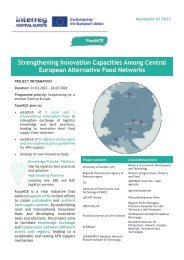The EU, the EEU, and the War in Ukraine: Political Risks and Management Options
This special issue entitled “The EU, the EEU, and the War in Ukraine: Political Risks and Management Options” is published within the framework of the Jean Monnet Network project “The EU and the EEU: Between Conflict and Competition, Convergence and Cooperation” (EUCON). The aim of this project co-funded by the Erasmus+ programme is to explore the complexity of relations between the European Union and the Eurasian Economic Union.
This special issue entitled “The EU, the EEU, and the War in Ukraine: Political Risks and Management Options” is published within the framework of the Jean Monnet Network project “The EU and the EEU: Between Conflict and Competition, Convergence and Cooperation” (EUCON). The aim of this project co-funded by the Erasmus+ programme is to explore the complexity of relations between the European Union and the Eurasian Economic Union.
- No tags were found...
You also want an ePaper? Increase the reach of your titles
YUMPU automatically turns print PDFs into web optimized ePapers that Google loves.
Oxana Karnaukhova<br />
<strong>The</strong>se discussions are even more relevant regard<strong>in</strong>g <strong>the</strong> so-called economic sovereignty of<br />
<strong>the</strong> state, <strong>the</strong> exercise of its regional or global leadership <strong>and</strong> <strong>the</strong> mechanisms of geopolitical<br />
<strong>and</strong> geo-economic decision-mak<strong>in</strong>g. As def<strong>in</strong>ed by Keohane <strong>and</strong> Nye (1977), ‘sovereignty is <strong>the</strong><br />
exclusive right to determ<strong>in</strong>e <strong>the</strong> framework of rules, regulations <strong>and</strong> policies with<strong>in</strong> a territory’.<br />
Accord<strong>in</strong>g to <strong>in</strong>stitutional <strong>and</strong> poststructuralist accounts, <strong>the</strong> state is seen as anchored <strong>in</strong> a wide<br />
cultural environment (Anderson 1986; Spruyt 1994). Sovereignty is viewed as a social status<br />
recognized that legitimates states to make decisions on behalf of community as supreme <strong>and</strong><br />
<strong>in</strong>dependent of outside authorities (Biersteker/Weber 1996; Jarvis/Paol<strong>in</strong>i 1995). <strong>The</strong>re is also<br />
external sovereignty, which is caught by <strong>the</strong> process of legitimation through recognition from<br />
outside. As Charles Doran (1989) noted, ‘<strong>in</strong>ternational political role reflects <strong>the</strong> set of foreign<br />
policy <strong>in</strong>terests that a state has actually achieved’. <strong>The</strong>se <strong>in</strong>terests are located <strong>in</strong>-between of<br />
national capabilities <strong>and</strong> aspirations, <strong>and</strong> <strong>the</strong> will<strong>in</strong>gness of o<strong>the</strong>r recognized members to allow<br />
<strong>the</strong> state to achieve its <strong>in</strong>terests. Thus, <strong>the</strong>se are <strong>in</strong>terstate relations with<strong>in</strong> <strong>the</strong> <strong>in</strong>ternational<br />
system.<br />
Autonomy of <strong>in</strong>ternal <strong>and</strong> external decision-mak<strong>in</strong>g <strong>and</strong> governance are tightly l<strong>in</strong>ked with<br />
power control <strong>and</strong> policy efficiency, <strong>and</strong> such policy efficacy as operational sovereignty is not<br />
constra<strong>in</strong>ed by external forces (Waltz 1969; Keohane 1993). Globalization questions <strong>the</strong> primary<br />
idea of governance based on geographical jurisdiction that is state sovereignty. Mult<strong>in</strong>ational<br />
enterprises play a central role <strong>in</strong> <strong>the</strong> process of such alienation as a result of digitalization <strong>and</strong><br />
of <strong>the</strong> rise of networked strategic alliances, <strong>in</strong>creas<strong>in</strong>g importance of transnational actors <strong>and</strong><br />
fur<strong>the</strong>r regionalisation.<br />
In this paper <strong>the</strong> particularities are questioned of <strong>the</strong> sovereignty exercise <strong>in</strong> develop<strong>in</strong>g economies<br />
<strong>and</strong> <strong>the</strong> extent to which economic sovereignty <strong>in</strong>terfaces with complex regionalisations,<br />
us<strong>in</strong>g Central Asia as an example. <strong>The</strong> case of Central Asia is chosen as experienc<strong>in</strong>g both<br />
pressures from <strong>the</strong> multi-vector <strong>in</strong>tegration projects of <strong>the</strong> <strong>EU</strong>, EA<strong>EU</strong> <strong>and</strong> One Belt One Road,<br />
<strong>and</strong> <strong>in</strong>ternal gravitational pressures. <strong>The</strong> widespread idea of <strong>the</strong> “sunset” of state sovereignty<br />
is <strong>in</strong>vestigated as a strategic decision-maker <strong>in</strong> <strong>the</strong> external economic policy, as well as <strong>the</strong><br />
possible implications for mult<strong>in</strong>ational corporations as a necessary l<strong>in</strong>k <strong>in</strong> <strong>the</strong> regional leadership<br />
strategy undertaken <strong>in</strong> emerg<strong>in</strong>g economies.<br />
First, <strong>the</strong> terms of economic sovereignty, leadership, <strong>and</strong> power are def<strong>in</strong>ed, which are frequently<br />
used <strong>in</strong> <strong>the</strong> vast majority of literature on regionalism transformations, nation-states position<strong>in</strong>g<br />
<strong>and</strong> contested <strong>in</strong>tegrations. Next, <strong>the</strong> chapter exam<strong>in</strong>es <strong>the</strong> geopolitical context <strong>in</strong> which<br />
Central Asian economies operate <strong>and</strong> <strong>the</strong> risks faced by companies. F<strong>in</strong>ally, <strong>the</strong> implication of<br />
<strong>the</strong> globalization <strong>and</strong> regionalization on Central Asia strategy <strong>and</strong> <strong>the</strong> possible impact of multivector<strong>in</strong>g<br />
on MNCs will be exam<strong>in</strong>ed.<br />
38 Wirtschaft und <strong>Management</strong> · B<strong>and</strong> 33 · März 2023















